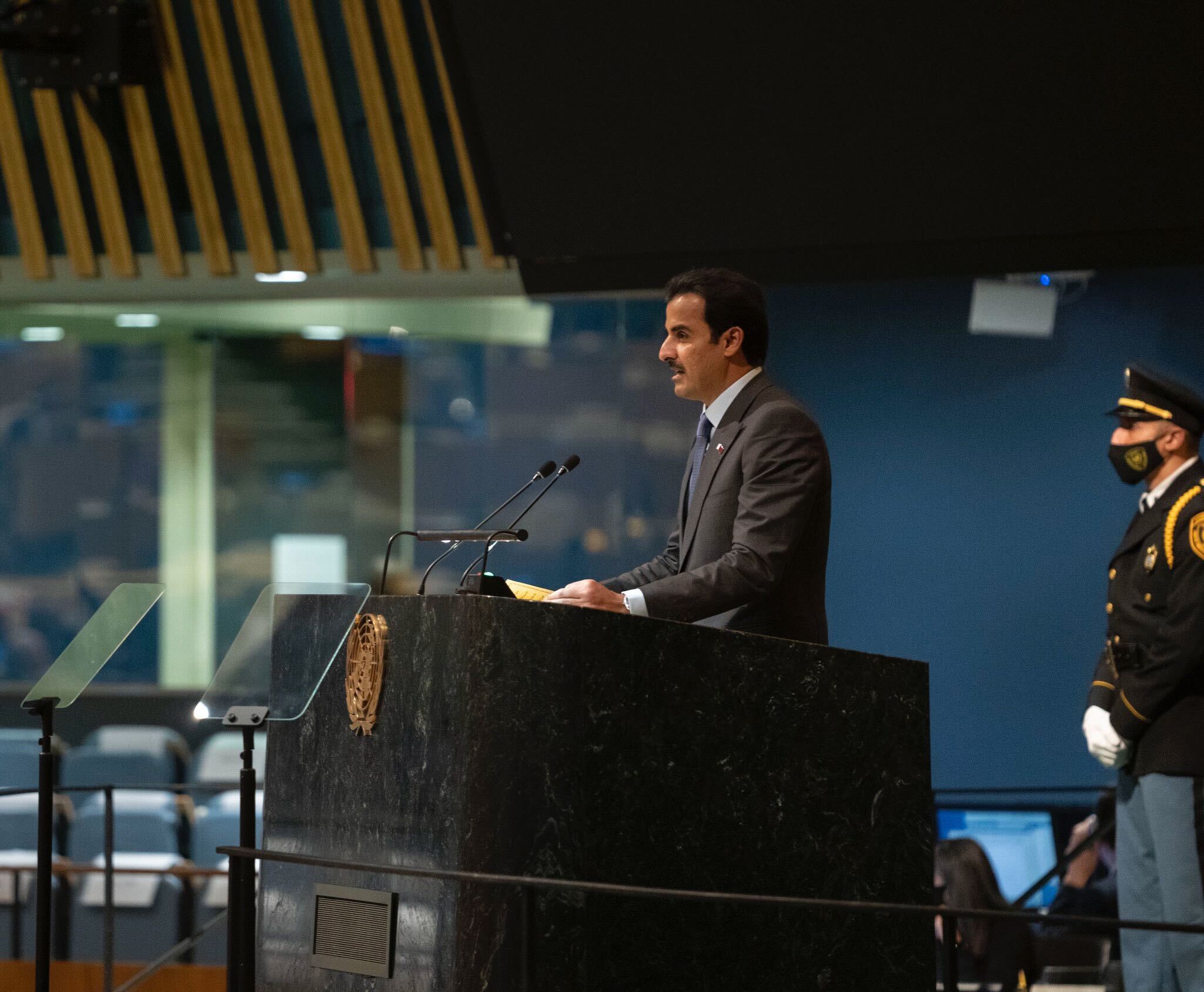Doha News is in New York to report on this year’s United Nations General Assembly .
Qatar’s Amir Sheikh Tamim bin Hamad Al Thani delivered yet another powerful address at the 77th United Nations General Assembly (UNGA) in New York on Tuesday.
During his speech, his tenth since becoming amir in 2013, the Qatari leader highlighted key issues concerning the Middle East region and beyond while taking aim at the perceived polarisation in addressing them.
“Whether the belief is that the world is unipolar or multipolar, international politics is still run in accordance with the rationale of countries that own varying capabilities, interests and priorities, and not in line with the logic of one world and one humanity,” said Amir Tamim.
Palestine
With the Palestinian cause remaining a core element of Qatar’s foreign policy, Amir Tamim renewed the need to implement international resolutions and press Israel to end its illegal occupation.
“The Palestinian cause is still unresolved, and in light of the failure to implement the resolutions of international legitimacy and with the persistent change of facts on the ground the settler occupation has pursued a fait accompli policy,” said Sheikh Tamim.
The leader renewed Qatar’s full solidarity with Palestinians “in their aspiration for justice” while calling on the Security Council to “compel Israel to end the Palestinian territories’ occupation.”
Sheikh Tamim also renewed Qatar’s stance in supporting the establishment of a Palestinian state on the 1967 borders, with East Jerusalem as its capital.
Syria
With the Syria crisis continuing to go unresolved as the Bashar Al Assad regime gripping to power, Amir Tamim dedicated a part of his speech to the conflict in a bid to raise awareness.
“In our region the international community failed to hold the war criminals in Syria accountable for what they had perpetrated. And in furtherance of the disillusionment, some are seeking to turn the page on the tragedy of the Syrian people,” said the amir.
Sheikh Tamim added that the Syrian crisis represents “an important lesson regarding the consequences of the absence of a long-term vision from the active forces of the international community”.
The Qatari leader urged a need to address the concerns and respond to the plight of the Syrian people, including millions of refugees who have been forced out of their homes during the decade-long conflict.
“We must pay attention to the roots of the issues before their impacts knock on the doors of our countries,” said the amir.
Libya
Libya has continued to witness political unrest amid ongoing violence.
Qatar’s amir demanded an immediate international response in order to complete the Libyan political process and urged for an agreement to hold the long-delayed elections.
“Everyone realises that the state cannot be restored without uniting the military forces and rehabilitating the armed factions into a single national army, discarding those who reject this solution and holding them accountable,” said the amir.
Other Middle East issues
The war in Yemen has remained an issue of concern for Qatar, which has long called for a peaceful resolution in accordance with UN charters, especially Resolution 2216.
“In Yemen, we see a glimmer of hope in the parties’ consensus on a temporary truce, and we are looking forward to a comprehensive and permanent ceasefire in preparation for negotiations between the Yemeni parties,” said Sheikh Tamim.
The amir also tapped into other regional issues, including sectarianism in Iraq, multi-layered crises in Lebanon, as well as Sudan, where he called for the need to reach a national consensus.
“It is not only possible, but also very realistic if there is a will and willingness to make concessions to reach compromises and abandon the sectarian partisan quotas approach which is rejected by the younger generations,” he said.
Iran nuclear deal
Touching on efforts to revive the Iran nuclear deal, Amir Tamim stressed the need to reach an agreement that addresses the concerns of all parties.
“No one has an alternative to such an agreement, and reaching it would be in the interest in the security and stability of the region and will open the door to a broader dialogue at the regional security level,” said the amir.
Afghanistan
More than year following the Taliban takeover of Kabul, Qatar has continued to extend a helping hand to Afghanistan and its people.
Speaking to world leaders, the amir called on all Afghan parties to preserve and build on the 2020 Doha Peace Agreement achievements by preventing the country from “becoming a haven” for terrorism.
“We have repeatedly stressed the need to protect civilians, respect human and citizen rights in Afghanistan, including women’s rights, girls’ right to education, and achieve national reconciliation among the factions of the Afghan people,” he said.
Energy crisis
Tuesday’s high-profile UN session comes in light of an energy crisis that was exacerbated by the Russian invasion of Ukraine in February this year. However, Sheikh Tamim noted that the lack of global coordination throughout the past decades has also played a role in the latest circumstances.
“Nearly a billion people worldwide are living without a reliable primary source of energy. The war crisis in Ukraine might be a new one, but the situations wherein political crises evolve into an energy crisis are not new, as they were exacerbating quietly,” said the amir.
As a key exporter of liquified natural gas (LNG), a cleaner alternative for energy, the amir emphasised the importance of protecting the environment.
“We have to provide energy in the meantime, and to realistically realise that the future of energy would include a diverse mix of its sustainable sources, such as solar energy, hydrogen, wind energy and hydrocarbon sources,” said the amir.
The Qatari leader added that the current global realities “depict a bleak image of the future of humanity”, stressing the importance of dialogue and joint action to face such crises.
“Each of us has a role to play, and what seems impossible today may become an achievable reality when there is a vision, will and good intentions,” said the amir.







